gerrymandering
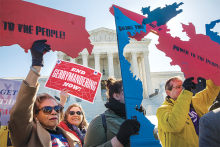
SINCE PRESIDENT TRUMP urged Texas lawmakers to get him “five more seats” in the House of Representatives before the 2026 mid-term elections, the words “redistricting” and “gerrymandering” have grabbed news headlines. Texas has redrawn congressional districts to give the Republican party an advantage. California is leading a countermove to redraw districts to give Democrats an edge. Other states are considering similar ploys along partisan lines.
Redistricting is the process of revising the boundaries of districts from which legislators are elected. Normally, redistricting takes place once a decade following the national census. Using new data on population changes and racial diversity, each state is required to redraw voting districts to provide balanced populations for congressional and state representation.
Gerrymandering happens when redistricting goes rogue. The word dates from 1812, when Massachusetts Gov. Elbridge Gerry permitted a congressional district map drawn to benefit his own party. One district, shaped like a monstrous salamander, caught press attention. Ever since, distorted districts have been called “Gerry-manders.”

WHAT MAKES THE parable of the good Samaritan so iconic and powerful? There’s a lesson about helping others in need, sure. But as Jesus taught a few chapters earlier, everybody helps those in their inner circle or who can pay them back (Luke 6:32-34). No, the point of the good Samaritan parable (Luke 10:25-37) is that really “loving our neighbor” looks like tangible service, at some cost to ourselves, even when it’s someone outside our ethno-religious group. “Good Samaritans” are the sorts of people Jesus wants to present to the world to say, “These are my representatives.”
These days, there’s tremendous concern about the rise of “white Christian nationalism,” and with good reason. I’ve spent nearly a decade documenting the impact of this ideology—the belief that America has been and should always be for “Christians like us”—on Americans’ political views and behaviors. The results are alarming. But one potential risk of our being genuinely concerned about the real threat of Christian nationalism is that young Christians can feel like any political participation is tainted or suspect—we wouldn’t want to be Christian nationalists, after all. On the contrary, Christian political involvement can be a tremendous witness when we think about what it means to be good Samaritans today.
Americans who subscribe to white Christian nationalism think in terms of in-groups and hierarchies. They believe their group made the nation prosperous and that their cultural and political power is being threatened by ethnic and religious outsiders, such as immigrants, Muslims, secular persons, LGBTQ persons, and those who challenge the racial status quo like Black Lives Matter. Because of this, the political goals of white Christian nationalism are fundamentally anti-pluralist and anti-democratic. The goal isn’t to include more voices; the goal is power for “us.”
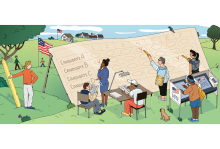
THE MIDTERM ELECTION season is already underway, with a great deal at stake. In the face of the rush of political ads, phone calls, debates, and more, I’m reminded of the Apostle Paul’s timeless words that the “fruit of the Spirit is love, joy, peace, patience, kindness, goodness, faithfulness, gentleness, and self-control” (Galatians 5:22-23). These fruits, or virtues, don’t easily translate into the messiness of politics, but they are desperately needed today. Sadly, our electoral system increasingly rewards and perpetuates antithetical “fruits”—such as contempt, vitriol, hate for the “other side,” and fear. The root causes include media echo chambers, gerrymandered districts, disinformation promulgated on social media, and partisan primaries—the negative aspects of which receive precious little attention. Until we change the perverted incentives that have become hardwired into our electoral system, our politics will remain stuck in a vicious cycle of acrimony and stalemate.
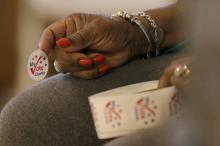
The ruling, authored by Chief justice John Roberts, delivered a huge setback to election reformers who had hoped the court would intervene over a growing trend in which parties that control state legislatures use the electoral district line-drawing process to cement their grip on power and dilute the voting power of people who support the rival party.

IN THE FIGHT against gerrymandered electoral districts in Pennsylvania, Carol Kuniholm is a rock star.
A former English professor and youth pastor, Kuniholm now spends much of her time traveling the Keystone State, explaining to hundreds of listeners how politicians have deliberately redrawn Pennsylvania’s voting districts to favor their own party. Using charts and graphs, Kuniholm shows, in lucid detail, how the disfigured districts chill democracy. “Democracy means voters choose their politicians,” explains the website of Fair Districts PA, an anti-gerrymandering organization Kuniholm co-founded in 2016. “Current Pennsylvania law lets politicians choose their voters.”
Plain-spoken and precise, Kuniholm hasn’t changed her demeanor since taking charge of the state movement, though she did make one concession to her newfound fame: “I bought a suit,” she confesses.
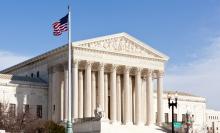
The Supreme Court on Tuesday debated whether new congressional districts drawn up in Texas constitute “racial gerrymandering” because they intentionally dilute the voting blocs of new Latino and black residents, a case that could have a lasting effect on how electoral districts are drawn.
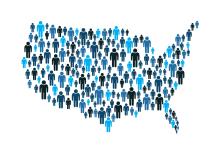
An inaccurate census means more than a mistaken count of the U.S. population: Census data not only determines how many congressional districts each state gets, it also often determines the disbursement of federal funds. Urban, lower-income areas with a high population of immigrants and people of color are often the most affected by undercounting and the lack of funding that comes with it.

THE GREAT POLITICAL and historical reality behind the incendiary rhetoric and conflict we have been experiencing in our country is this: In just a few decades, America will no longer be a white-majority nation; we will instead be a majority of minorities.
Some of our citizens, especially many older white Americans, are deeply fearful and resentful about the potential loss of white supremacy and privilege. They will not let this happen without a fight. Already there is a clear strategy to try to ensure that the changing demographic does not change America. There is a five-part strategy in place to delay, obstruct, and veto the new America.
First, gerrymander congressional districts. Second, shift the goal of immigration reform away from full citizenship, preventing the enfranchisement of 11 million new voters. Third, incarcerate mass numbers of citizens, leading to their political disenfranchisement. Fourth, put in place new voting regulations that make it harder for many people to vote. Fifth, elect a strong-man candidate who promises to do to “whatever it takes” to ensure that America does not change.
GLOBALLY, those who are on the “wrong” side of the categories, the most marginalized, find themselves most vulnerable to the devastating impacts of climate change, war, displacement, and poverty. As conflict rages in the most fragile countries, millions of people, many of them women and children, are displaced from their homes. The global response has been unacceptable. In Europe and the United States, politicians have stoked xenophobic and Islamophobic sentiments to block refugees seeking asylum. Walls are being built to keep the “others” out. Aid and relief to these areas are being cut in favor of expanding military budgets. Race sits at the intersection of all of these issues.
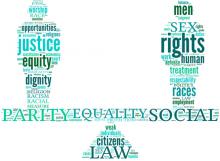
Adaptation is how a bitter and broken South survived its own worst instincts after the war. Progressive pockets emerged in college towns and later in large cities. Hungry for Northern business, the region became less racially polarized. In time, a black man could become mayor of Atlanta and another could become the Episcopal bishop of North Carolina.
The Rev. Martin Luther King, Jr.’s dream of 50 years ago came to seem possible. Distant, yet possible.
But now the dream has receded. The fact of a black president seems to have reopened a pulsing vein of racism. Operating under cover of fiscal austerity, vengeful state politicians are gutting decades of programs that helped the South move forward by helping blacks and Latinos to have a chance.
No more affirmative action, they say; no more dark-skinned citizens flocking to voting stations; no more voting districts shaped by fairness; no more protections from ground-level aggression against people of color.
Once again, as happened in the 19th century, impoverished whites who should be lining up to resist predatory behavior by the moneyed class are being turned against their own best interests by race politics.